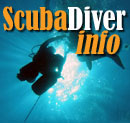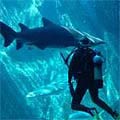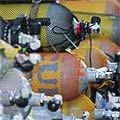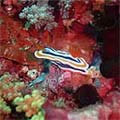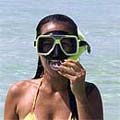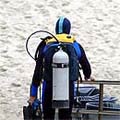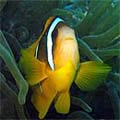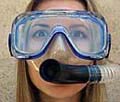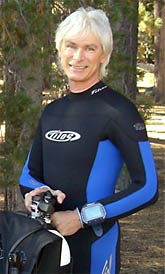« NAUI Advanced Scuba certification! | Main | Mapping diving sites »
November 21, 2006
More on Scuba books
In an earlier entry I contemplated the one thing I don't like about Scuba, that you can't just do it whenever you feel like. And I mentioned that reading diving books helps at least a little. By now I picked the shelves at Borders clean and there's nothing else they have that I haven't already read, and there isn't much on diving to begin with.
So as the days get colder and my next dive trip seems far away, I've read more books, most I located and ordered from Amazon. It's interesting how some topics attract more writers and writing than others. The Andrea Doria, for example, lures writers, and so she is the star, or at least extensively mentioned, in several books. Deep Descent -- Adventure and Death Diving the Andrea Doria by Kevin F. McMurray is one, a 300-page book all dedicated to the Italian Cruise liner that sank 1956 in a freak accident that had her collide on open sea with another vessel. McMurray is both an acclaimed journalist and photographer as well as an expert scuba diver, and so reading his book is sheer pleasure, though it stops at the status-quo of 2001, and I am sure more activity has taken place around the Doria since then.
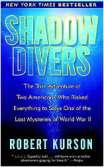
 I also read Shadow Divers by Robert Kurson, a book that focuses on the discovery and subsequent identification attempt of a German U-boat from World War II. It's exceptionally well written and provides a rich story of diving, adventure, dangers, death, and how a wreck can become a consuming passion. Shadow Divers overlaps some of the Andrea Doria coverage in other books, and also some of the tragic ending of the Rouse father-and-son dive team that perished diving that U-boat, as described in Bernie Chowdhury's The Last Dive. A common theme, or sub-theme, in all those books covering the North Atlantic's famous wrecks is an oddly intense rivalry between diving charter boats, their captains, their crews, and divers in their camps. Sometimes it seems strange that people with the same dream and passion should end up fighting one another. In the instance of the U-boat, Kurson's book even triggered a full-blown rebuttal, a similarly named book that claims to tell the real story.
I also read Shadow Divers by Robert Kurson, a book that focuses on the discovery and subsequent identification attempt of a German U-boat from World War II. It's exceptionally well written and provides a rich story of diving, adventure, dangers, death, and how a wreck can become a consuming passion. Shadow Divers overlaps some of the Andrea Doria coverage in other books, and also some of the tragic ending of the Rouse father-and-son dive team that perished diving that U-boat, as described in Bernie Chowdhury's The Last Dive. A common theme, or sub-theme, in all those books covering the North Atlantic's famous wrecks is an oddly intense rivalry between diving charter boats, their captains, their crews, and divers in their camps. Sometimes it seems strange that people with the same dream and passion should end up fighting one another. In the instance of the U-boat, Kurson's book even triggered a full-blown rebuttal, a similarly named book that claims to tell the real story.

 And the rivalries don't end there. There always seems an undertone of rivalry between the Florida cave divers and the North Atlantic wreck divers, each contingent considering the other lacking and misguided. But it doesn't stop there. While reading Jacques Cousteau's The Silent World, this otherwise magnificent, groundbreaking volume rarely missed an opportuniy to emphasize the superiority of the scuba diver -- or aqualung-wearing manfish in Cousteau's terminology -- over the clunky, destructive, limited helmet divers that stagger along the ocean floor, trampling and destroying things, while the manfish freely hovers above. But not all see the scuba diver that way, and certainly not Carlos Eyles, a freespirited breath-hold diver with several books to his credit. In the remarkable The Blue Edge, Eyles, a most interesting character, praises the breath-hold diver's freedom and oneness with the sea compared to the clumsiness and technological overkill of scuba.
And the rivalries don't end there. There always seems an undertone of rivalry between the Florida cave divers and the North Atlantic wreck divers, each contingent considering the other lacking and misguided. But it doesn't stop there. While reading Jacques Cousteau's The Silent World, this otherwise magnificent, groundbreaking volume rarely missed an opportuniy to emphasize the superiority of the scuba diver -- or aqualung-wearing manfish in Cousteau's terminology -- over the clunky, destructive, limited helmet divers that stagger along the ocean floor, trampling and destroying things, while the manfish freely hovers above. But not all see the scuba diver that way, and certainly not Carlos Eyles, a freespirited breath-hold diver with several books to his credit. In the remarkable The Blue Edge, Eyles, a most interesting character, praises the breath-hold diver's freedom and oneness with the sea compared to the clumsiness and technological overkill of scuba.
Cousteau himself, the great diving pioneer, is often the target of criticism. His accomplishments, while not entirely dismissed, are qualified as secondary to his showmanship and supposed claiming of others' discoveries and accomplishments. His cave and cavern diving exploits are attacked as amateurish, dated and lacking. Yes, there are rivalries aplenty. More than I'd expect in a small cmmunity of total experts, one I thought was as tightly-knit as it gets.
And it continues on to equipment and technology. From Cousteau's claims of superiority of the aqualung to breath-hold divers' dismissal of scuba, to fierce fights over the benefits of breathing gases specially mixed for certain diving tasks. Technologies such as the re-breather are described as death traps and accidents to happen in one book, and as the future of diving in others. And so on.
Even sealife is viewed in different ways, and none so more than sharks. The general consensus in scuba books seems to be that sea creatures are essentially non-aggressive. Leave them alone, and they'll leave you alone. If you antagonize one, quietly back off and away, and it'll leave you alone. Almost every diving book covers sharks in some way. And almost always the point is that sharks -- while definitely wild animals and unpredictable -- are not the danger they're made out to be. Not surprisingly, spearfishermen such as Carlos Eyles vehemently disagree. To them, the shark is the enemy, the one who not only tries to snatch away their catch, but also is an ever-present danger. Scuba divers dismiss that; hey, if they carry bleeding fish, what do they expect? But spear-divers simply seem to fear sharks a whole lot more, and have scary stories to back up the fear. Yes, Jaws does eat people.
Diving polarizes men. And women, of course. It means different things to them. All agree it's wonderful and life-changing. But the impact on their souls is different for each. As are the passions and issues that become important to them.
An entirely different genre is the books that simply describe diving and diving equipment. When I was totally new to the sport, I devoured them, learning as much as I could. All I read are good, but even there the approaches vary. One emphasizes personal experience. Another clinically observes and describes. A third uses elaborate graphics and gorgeous layout and presentation. And a forth mixes a textbook introduction to equipment with dive stories and experiences.
I like reading them all. The books tide me over until my next dive, and they teach me new things, ways of thinking, different perspectives. Each tells a story, each occupied an author's life. And each occupies my mind as well.
Posted by conradb212 at November 21, 2006 11:02 PM
